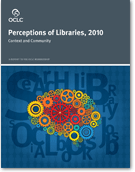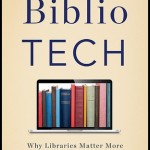The latest outcry in the library world is that Reference is dead. Where’s the body? What part of reference is dead? And what should we do about it?
Reference isn’t what it used to be. Librarians are not the high priests and priestesses of information, and probably weren’t even when we thought we were. The type of ready-reference questions that used to make up a significant part of a public library’s reference diet have gone to Google. Ready-reference is dead. And that is not news. Joseph Janes has been talking about this for five years at least, based on these notes from his Internet Librarian keynote in 2007. I’m pretty sure I heard him say this sometime before 2007, but this is the earliest date I can prove.
 OCLC’s Perceptions of Libraries 2010 report shows that users don’t start their information searches on library websites. Is anyone actually surprised? On the other hand, what does surprise me is the number of times that this data point is used to support the argument that reference is dead. What does one have to do with the other? Reference has never been about the question, it’s always been about the service.
OCLC’s Perceptions of Libraries 2010 report shows that users don’t start their information searches on library websites. Is anyone actually surprised? On the other hand, what does surprise me is the number of times that this data point is used to support the argument that reference is dead. What does one have to do with the other? Reference has never been about the question, it’s always been about the service.
The OCLC report goes on to say that people who have positive view of libraries support libraries, and that people are increasing their use of libraries, in spite of, or perhaps because of the fact that people are increasing their use of technology across all age groups. Everybody does everything online at every age, and everyone seems to want to continue to do it at the library. And although reference may be dead, everyone wants more service.
So what is service if it isn’t reference, and who should provide it?
 Service is whatever the person who comes into the library, whether that is online or physically, defines it to be. If they walk out happy, we’re golden. If they don’t, we’re idiots. Some of the pundits seem to have lost sight of this. I agree that directional questions are not reference, but someone needs to assist people with them, otherwise we don’t just seem, we are, cold and unhelpful places. But the fortress-type reference desks of the past are not what users expect to see in the here-and-now, and staff who go out among the PCs, the wireless user area, and the stacks to seek out people who need help are a better way to provide service for most people. At the same time, it’s not the only way. Just like some people won’t ask directions when they are lost, some people won’t admit they need help when someone approaches them, they will wait until they are totally befuddled, then seek a place where help is available. Human nature is contrary.
Service is whatever the person who comes into the library, whether that is online or physically, defines it to be. If they walk out happy, we’re golden. If they don’t, we’re idiots. Some of the pundits seem to have lost sight of this. I agree that directional questions are not reference, but someone needs to assist people with them, otherwise we don’t just seem, we are, cold and unhelpful places. But the fortress-type reference desks of the past are not what users expect to see in the here-and-now, and staff who go out among the PCs, the wireless user area, and the stacks to seek out people who need help are a better way to provide service for most people. At the same time, it’s not the only way. Just like some people won’t ask directions when they are lost, some people won’t admit they need help when someone approaches them, they will wait until they are totally befuddled, then seek a place where help is available. Human nature is contrary.
A lot of what used to be reference questions have turned into questions about how to use technology. There are a lot of places outside the big cities, suburbs and university towns where the library is the geekiest spot in town, even if high speed bandwidth is only DSL speed. And that’s not because the librarians are resistant to change, it’s because the library is located somewhere in that infamous “last mile” for broadband service, and DSL is all there is, and that’s if the library is lucky.
Is reference dead, or dying? Or is it just changing?
The cry that “reference is dead” sounds a lot like an echo from McMastergate a couple of weeks ago. Librarians are expensive staff, and most libraries are facing budget cuts. If reference is dead, then just cutting reference librarians is a quick and easy way to reduce the budget. If reference has changed, and job descriptions and qualifications and staffing levels need to be seriously re-examined, that takes time, effort, and unfortunately, committees. It’s certainly not a quick and easy fix. But it provides better service if it’s done right.
And right is just not the same thing everywhere. One size doesn’t fit all. Saying “reference is dead” makes a good sound bite, but depends a lot upon definitions. The late Tip O’Neill is famous for saying, “All politics is local”. So is all library service. It’s provided by your funding agency to your community, whether that be your taxpayers to your city and county, or your student tuition and grant monies to your students and faculty. If the service is the right service, whether you call it reference or information services or just plain, “get help here”, users will keep coming in. If you don’t provide the right service, you will become irrelevant. There are some libraries, as Karen Schneider has posted, that are increasing relevance by providing, among other services, more research (in other words, reference) services.
And, for a reminder of just how varied local service can and should be, the profiles of just the nominees for the Best Small Library in America should remind all of us of the sheer number of things that libraries and librarians do. It’s not all about big libraries in big cities, or even medium sized libraries in medium sized towns.
Two of the three biggest lies are: 1)The check’s in the mail; and 2) One size fits all.
Library budgets are hurting right now. The checks that we have in the mail are smaller than they used to be. Using the one size fits all sound bite of “reference is dead” to cut reference librarians, instead of going through the more extensive exercise of transforming information services into what our communities need now will make us less relevant, not more relevant.







